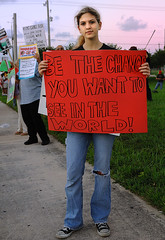Are We Too Sensitive?
Posted by Mitch Mitchell on Mar 2, 2013
On the heels of my previous post talking about criticism, I came across this editorial of something I hadn't even know had happened, but once I read it my first thought was "of course it happened, and of course it was Joan Rivers".
 via Compfight |
It was classic Joan Rivers, making an off the cuff joke about something because that's what she does. However, this time it was a joke about the Holocaust, and of course it caused an outrage. All sorts of people and organizations came out against her for making the joke, saying she of all people should be ashamed of herself because she's Jewish and lost relatives in the event. Her take on it; it was a joke and it makes sure to keep the memory of the Holocaust in everyone's minds.
My immediate response was that she's a jerk; I'll own up to that. I'm not a big fan of the Joan Rivers I've seen over the last 10 years, as I think she's gotten deliberately meaner as she's gotten older. However, as I said, I found out about it on this editorial on CNN's website written by a guy named Dean Obeidallah. His contention was that all of us around the world keep getting immediately outraged because of some comment or some bit of bad behavior by someone and that we should calm down because some of it makes no sense, as it's not really all that outrageous, and some of us are overly sensitive, as if we're waiting to be insulted by someone. That and one final fact; the things we get outraged over aren't the really important things such as war, gun violence and poverty.
I have mixed emotions on the editorial and the topic in general. I believe that people get outraged over some of the silliest stuff. I also believe a lot of it is generated by the media, whose ratings always go up when we get enraged about something. I felt myself getting caught up in a lot of that rage and that's when I stopped watching the news on TV some weeks ago.
Many of us have mores that prevent us from wanting to allow others who have no filters to make brass commentary on those things. Death is a big one, especially if it involved a lot of people. The Holocaust isn't alone; there have been jokes about the wars in Iraq and Afghanistan, jokes about Columbine, even jokes about 9/11/01. The majority haven't liked it, and some of those who said it apologized. Who remembers last year that Gilbert Gottfried lost his job as the AFLAC voice of the duck for making a joke about the Tokyo nuclear disaster pretty much as it was occurring? There were jokes about Phuket when it was flooding, and Haiti right after the earthquakes. The majority hated it, with reason; those who made the jokes didn't quite see it the same way.
I'm going to look at this issue as both a personal and leadership lesson on communications. Here's my opinion in 3 points:
1. There are times when something is going to be so inappropriate that you just can't give someone a break for saying it. This formed South Carolina politico who made a very demeaning statement about Trayvon Martin, the 16-year old who was killed by a local home watch guy, during the Super Bowl... there is no support for that at all. It doesn't matter who you are, laughing at a child who was shot and killed... sick.
2. Everyone's experiences and backgrounds are different, and depending on the audience, that humor just might be acceptable for that audience, even if the general public doesn't like it. Italians tell Italian jokes, black people tell black jokes, Jewish people tell Jewish jokes, Polish people tell Polish jokes, on and on. If someone knows their audience and tells these types of jokes, or says something inappropriate to that group, which understands where it's coming from, the rest of it might blast it but if we haven't lived that life it's pretty much our having to deal with it.
3. Something I say here often, and in other spaces as well, is if you feel you have to say something and that you have the right to say it, then go ahead and say it. If the rest of the world, or whomever, comes back at you in some fashion, even if you think it's over the top, deal with the consequences of your own actions and words as best you can. If you feel you're adult enough to say it, you're adult enough to stand up for your convictions, right? By the way, ask Salmon Rushdie how that's working out for him 25 years later.
Are we too sensitive? Possibly. Did you have to go there? Possibly not.

